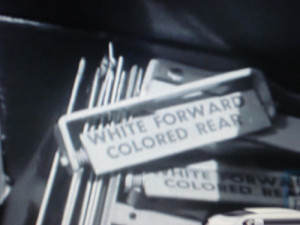Przejdź do trybu offline z Player FM !
The Power of No
Manage episode 40037502 series 41930
Rosa Parks demonstrated the power of, “No.”
Most Americans know her story.
Parks was riding the Cleveland Avenue bus home from work in Montgomery, Alabama on Dec. 1, 1955, when the white only seats in the front filled with passengers. Bus driver James Blake moved the “colored” section sign behind the row Parks was sitting in and demanded that she and the three other black passengers move to seats in the rear of the bus to accommodate the white riders.
Parks later said, “When that white driver stepped back toward us, when he waved his hand and ordered us up and out of our seats, I felt a determination cover my body like a quilt on a winter night.”
The three other people in the row complied.
Rosa Parks did not.
“When he saw me still sitting, he asked if I was going to stand up, and I said, ‘No, I’m not.’ And he said, ‘Well, if you don’t stand up, I’m going to have to call the police and have you arrested.’ I said, ‘You may do that,’” Parks recalled in a 1987 PBS documentary on the Civil Rights movement.
Notice what Parks did not do.
She did not punch the bus driver in the face. She did not pull a gun and start firing away at the police officers when they showed up to arrest her. Her actions had no “teeth.”
She just said, “No.”
In fact, she was the one bitten. Police arrested Parks and she spent a day in jail. She was tried four days later and convicted of disorderly conduct. The judge fined her $10 and $4 in court costs. She also lost her job as a seamstress at a local department store.
But Parks’ actions that day sparked the Montgomery bus boycott and ignited the civil rights movement. Dr. Martin Luther King Jr. rose to prominence during the boycott, and when it was all said and done, America was a different place. As the King Institute at Stanford University points out, “The bus boycott demonstrated the potential for nonviolent mass protest to successfully challenge racial segregation and served as an example for other southern campaigns that followed.”
Jim Crow died because one woman had the guts to say, “No.”
Would anybody argue that Parks’ actions lacked courage or effect simply because they didn’t have “teeth?”
Certainly not!
Yet we get this argument all the time at the Tenth Amendment Center when we support noncompliance bills lacking criminal penalties for federal agents.
As anybody who has stood in an arctic wind knows, things without teeth can still bite.
A simple, “No” carries great power. As Parks demonstrated, we don’t have to swing our fists, or lock up federal agents, to bring about sweeping changes. Simply refusing to comply can be a complete game-changer.
We need only look at the growing movement to nullify federal marijuana prohibition at the state level to see the truth.
According to the feds, it was illegal when California voters approved its medical marijuana program in 1996. They did it anyway. Californians looked the feds in the eyes and said, “No. We will not follow your law.”
The Supreme Court unsurprisingly affirmed federal power to regulate a plant grown in somebody’s back yard for pain relief in the 2005 Gonzales v. Raich decision. Did the people of California shut down their medical marijuana programs because the Supreme Court upheld the unconstitutional federal act? Nope. They looked the black-robed federal employees in the eye and said, “No, we don’t really care about your opinion.”
A funny thing happened over the years. Other states jumped on board, said, “No,” to federal marijuana laws, and started their own medical marijuana programs. Eighteen states to be exact, with more expected to join the ranks this year.
The people of Washington and Colorado took things to the next level last November. Voters approved legalization of weed across the board. The people said, “No, federal overlords. We will not comply with your so-called law.”
The feds continue to bluster and push back. They come in and raid dispensaries and threaten large-scale marijuana growers. But the issue continues to slip away from the federal government. It simply can’t force a large number of states to comply when the people don’t want to. For all practical purposes, we are witnessing the nullification of federal marijuana ‘laws.’
These state level marijuana acts don’t carry penalties at all. Not for the feds. Not for state agents. They feature no enforcement measures. They bare no teeth.
State marijuana bills simply set up a mechanism of noncompliance.
And they work.
Rosa Parks proved it. “No” can change the world.
The post The Power of No first appeared on Tenth Amendment Center.
99 odcinków
Manage episode 40037502 series 41930
Rosa Parks demonstrated the power of, “No.”
Most Americans know her story.
Parks was riding the Cleveland Avenue bus home from work in Montgomery, Alabama on Dec. 1, 1955, when the white only seats in the front filled with passengers. Bus driver James Blake moved the “colored” section sign behind the row Parks was sitting in and demanded that she and the three other black passengers move to seats in the rear of the bus to accommodate the white riders.
Parks later said, “When that white driver stepped back toward us, when he waved his hand and ordered us up and out of our seats, I felt a determination cover my body like a quilt on a winter night.”
The three other people in the row complied.
Rosa Parks did not.
“When he saw me still sitting, he asked if I was going to stand up, and I said, ‘No, I’m not.’ And he said, ‘Well, if you don’t stand up, I’m going to have to call the police and have you arrested.’ I said, ‘You may do that,’” Parks recalled in a 1987 PBS documentary on the Civil Rights movement.
Notice what Parks did not do.
She did not punch the bus driver in the face. She did not pull a gun and start firing away at the police officers when they showed up to arrest her. Her actions had no “teeth.”
She just said, “No.”
In fact, she was the one bitten. Police arrested Parks and she spent a day in jail. She was tried four days later and convicted of disorderly conduct. The judge fined her $10 and $4 in court costs. She also lost her job as a seamstress at a local department store.
But Parks’ actions that day sparked the Montgomery bus boycott and ignited the civil rights movement. Dr. Martin Luther King Jr. rose to prominence during the boycott, and when it was all said and done, America was a different place. As the King Institute at Stanford University points out, “The bus boycott demonstrated the potential for nonviolent mass protest to successfully challenge racial segregation and served as an example for other southern campaigns that followed.”
Jim Crow died because one woman had the guts to say, “No.”
Would anybody argue that Parks’ actions lacked courage or effect simply because they didn’t have “teeth?”
Certainly not!
Yet we get this argument all the time at the Tenth Amendment Center when we support noncompliance bills lacking criminal penalties for federal agents.
As anybody who has stood in an arctic wind knows, things without teeth can still bite.
A simple, “No” carries great power. As Parks demonstrated, we don’t have to swing our fists, or lock up federal agents, to bring about sweeping changes. Simply refusing to comply can be a complete game-changer.
We need only look at the growing movement to nullify federal marijuana prohibition at the state level to see the truth.
According to the feds, it was illegal when California voters approved its medical marijuana program in 1996. They did it anyway. Californians looked the feds in the eyes and said, “No. We will not follow your law.”
The Supreme Court unsurprisingly affirmed federal power to regulate a plant grown in somebody’s back yard for pain relief in the 2005 Gonzales v. Raich decision. Did the people of California shut down their medical marijuana programs because the Supreme Court upheld the unconstitutional federal act? Nope. They looked the black-robed federal employees in the eye and said, “No, we don’t really care about your opinion.”
A funny thing happened over the years. Other states jumped on board, said, “No,” to federal marijuana laws, and started their own medical marijuana programs. Eighteen states to be exact, with more expected to join the ranks this year.
The people of Washington and Colorado took things to the next level last November. Voters approved legalization of weed across the board. The people said, “No, federal overlords. We will not comply with your so-called law.”
The feds continue to bluster and push back. They come in and raid dispensaries and threaten large-scale marijuana growers. But the issue continues to slip away from the federal government. It simply can’t force a large number of states to comply when the people don’t want to. For all practical purposes, we are witnessing the nullification of federal marijuana ‘laws.’
These state level marijuana acts don’t carry penalties at all. Not for the feds. Not for state agents. They feature no enforcement measures. They bare no teeth.
State marijuana bills simply set up a mechanism of noncompliance.
And they work.
Rosa Parks proved it. “No” can change the world.
The post The Power of No first appeared on Tenth Amendment Center.
99 odcinków
Alle episoder
×Zapraszamy w Player FM
Odtwarzacz FM skanuje sieć w poszukiwaniu wysokiej jakości podcastów, abyś mógł się nią cieszyć już teraz. To najlepsza aplikacja do podcastów, działająca na Androidzie, iPhonie i Internecie. Zarejestruj się, aby zsynchronizować subskrypcje na różnych urządzeniach.





